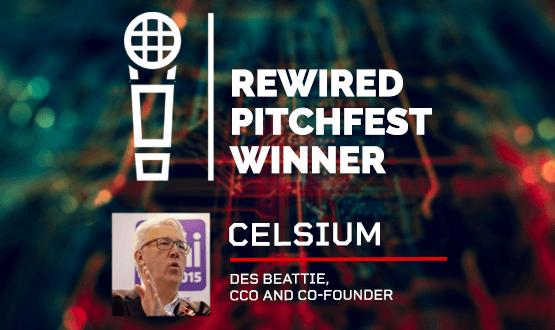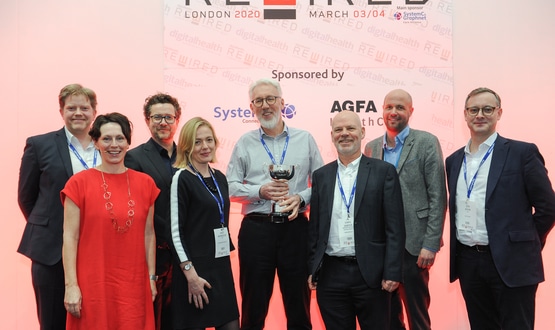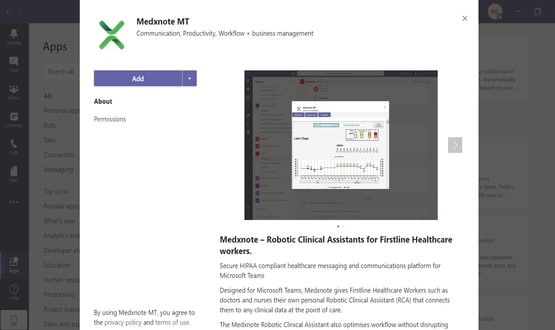Digital Health Rewired Pitchfest 2020 winner profile: Celsium

Did you know that body temperature technology hasn’t changed for 300 years? Clinicians are still using in vitro thermometers that we designed in the 1700s. Des Beattie and his team knew that needed to change, so they designed Celsium, a small device placed under a patient’s armpit that’s capable of taking their core temperature every four seconds.
Celsium was the winner of Digital Health Rewired Pitchfest 2020. Here, Des explains more about the innovation and how it could change the way the NHS works.
Tell us about Celsium and what it does
Despite being one of the four vital signs, there has been no meaningful advance in understanding core temperature since the arrival of the in vitro thermometer in the 1720s – 300 years!
So, instead of an invasive device that produces a single reading with a ±1.0C variance, imagine a device that’s non-invasive, has medical-grade accuracy (±0.1C) and delivers a data-point every four seconds to your smartphone, which means you can monitor your own core temperature in real time.
That’s what we have created Celsium to do.
What gave you the idea for your product?
Isn’t it astonishing that the other three vital signs operate with tons of technology that clinicians have ‘on tap’ enabling them better quality decisions faster?
Yet, arguably the most important of the four, core temperature, has remained the ‘hidden science’.
So, what would it take to drag a 300-year-old technology into the 21st Century and place it on a par with the other three where it belongs? Now, that’s a challenge.
How will your product change the way the NHS works?
Celsium has a huge variety of applications for the NHS, but the example I presented at Pitchfest was that last year the NHS admitted 180,000 patients with sepsis, of which 30,000 died.
Many others are only saved after life-changing surgery. In many cases, onset sepsis occurs with a temperature change. Spot the change early enough and it can be treated with antibiotics.
But that only applies if the system spots the change. For example, across an eight hour night shift many patients might only have their temperature taken one, two or three times. Celsium will measure a patient’s core temperature 7,200 times in the same time period.
So, a patient with onset sepsis presenting a core temperature change is going to be flagged very quickly for clinical intervention when they are wearing a Celsium device.
How have you got where you are now?
Sweat, belief, learning from mistakes, stress, and help from folks we didn’t think would want to help. Plus, assembling a team that knows what they need to do.
Why did you decide to enter the health start-up space?
Founder, Andy Mahoney, and I worked together in the healthcare software space previously, so it seemed likely we would end up working on a project together at some point.
However, both of us were only going to develop a technology that would tackle a problem that no one was able to do. Frankly, Celsium is exceeding that brief in ways we wouldn’t have thought possible when we started.
Have you faced many barriers?
Plenty! The biggest being that we don’t fit the neat definitions that healthcare systems and investors work with.
The healthcare sector defines its tasks with ‘vertical’ names such as cancer, sepsis, Type 2 diabetes, hip-replacement ops, clinical trials, and then organises specialist people, kits, and tech to tackle those verticals.
However, Celsium is ‘horizontal’ which means we are capable of adding a unique, explicit value across all of these sectors, and this makes it harder for others to define us by the usual clinical, operational and economic boundaries because for us, those boundaries are so huge.
It has really taken events such as winning Pitchfest, and the extraordinary emergence of Covid-19, for the wider world to begin realising that current temperature-capture techniques (the digital thermometer) simply can’t deliver what clinicians actually will need in the next few months and years.
Why did you decide to enter Digital Health Rewired Pitchfest 2020?
We spent all of 2019 in stealth mode but by the start of 2020 we felt we had got our product, development and value proposition to a point that Celsium needed the scrutiny of the healthcare sector.
A competition such as Pitchfest, which attracts entries from all over the world, enabled us to compare our progress (good or bad!) against some world-class technologies.
How did you find the experience?
We won, so of course it was great!
The practice session a couple of weeks beforehand was instrumental in our getting the pitch right for the three minute timing.
It was really, really tight for me, however, practice made perfect on the day.
Looking to the future, what do you hope your product will achieve and what’s the next step in achieving that goal?
Celsium has much to do to maximise its potential. Part of our prize is a fantastic opportunity to work on a project with Chelsea & Westminster and I suspect in the current circumstances we may focus ourselves to a Covid-19 project – we’re looking forward to scoping that out with them.
As a business, we have three long-arc ambitions:
- Democratise core temperature as our device becomes smaller and more affordable so that Celsium is available anywhere in the world at an arms-length of need
- Introducing Celsium to tackle global unmet medical need. This costs several trillion dollars every year. Sepsis alone kills 11 million people every year, so with access to a cost-effective, constant core temperature device, clinicians will get a tool to help tackle much of the above
- We are creating the Celsium Platform to collect billions of tagged data points that will enable researchers to apply machine learning techniques to finally reveal the vast hidden science of core temperature, that 300 years of legacy thermometers has not been able to achieve
What advice would you give to someone looking to enter the health start-up space?
This is summed up in a great quote I read some years ago: “There is no point trying to build the next Microsoft, Google or Facebook. They’re all built, and unless you have a 10x improvement to offer, you’re wasting your time.”
So, apply that principle to the health-tech space. How many more PASs, clinical decision support systems or tele-consulting packages does the world need?
Instead, sit with as many healthcare professionals as you can, and ask them this question: If you could only fix one big thing in your day job, what would it be? Somewhere in all of the answers you receive will be a great solution waiting for you to build.




